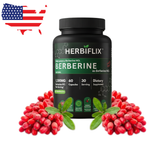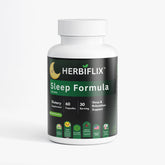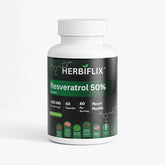What Happens When You Stop Taking Berberine? Managing Your Metabolic Health Post-Supplementation
What Happens When You Stop Taking Berberine? Managing Your Metabolic Health Post-Supplementation
For many individuals seeking natural pathways to support their well-being, Berberine has emerged as a powerhouse botanical. Revered for its potential in areas like blood sugar support, cholesterol management, and overall metabolic health, this plant alkaloid has garnered significant attention from both the scientific community and those proactively managing their health. However, a common question arises for long-term users or those considering a break: what exactly happens when you stop taking Berberine? Understanding the potential shifts and how to proactively manage your metabolic health post-supplementation is key to maintaining your progress.
Understanding Berberine's Mechanism of Action
Before delving into what happens post-supplementation, it's crucial to grasp how Berberine works. This compound doesn't "cure" metabolic imbalances; rather, it actively supports various physiological processes. One of its most well-known actions is the activation of AMP-activated protein kinase (AMPK), often dubbed the "master regulator of metabolism." By activating AMPK, Berberine can:
- Improve insulin sensitivity, helping cells utilize glucose more efficiently.
- Reduce glucose production in the liver.
- Support healthy lipid metabolism, influencing cholesterol and triglyceride levels.
- Promote healthy gut microbiome balance.
These actions contribute to its efficacy in providing robust blood sugar support and enhancing overall metabolic health. When you stop introducing Berberine into your system, these supportive mechanisms gradually decrease, meaning your body will need to rely more heavily on its own inherent regulatory systems and other lifestyle factors.
What to Expect When Discontinuing Berberine
It's important to clarify that stopping Berberine is not akin to experiencing withdrawal symptoms from addictive substances. Berberine is not habit-forming. However, you may notice a gradual return of certain metabolic markers to their pre-supplementation levels, especially if underlying lifestyle factors haven't been adequately addressed. Here's what some individuals might experience:
- Blood Sugar Levels: For those using Berberine for blood sugar support, a primary concern is that glucose levels might gradually increase back towards their previous baseline. This is because the enhanced insulin sensitivity and reduced liver glucose production supported by Berberine will diminish.
- Lipid Profiles: If Berberine was helping to manage cholesterol or triglyceride levels, these markers could also see an upward trend over time as its beneficial effects on lipid metabolism fade.
- Weight Management: Some individuals experience modest weight management benefits with Berberine, partly due to its effects on metabolism and gut health. Discontinuation might see a subtle shift if dietary and exercise habits aren't consistently maintained.
- Digestive Changes: Berberine influences the gut microbiome. Some users might notice minor digestive shifts, though this is usually temporary and mild.
The extent of these changes varies significantly from person to person, depending on individual physiology, the duration of supplementation, the original reason for taking Berberine, and, most critically, the lifestyle interventions in place. It's not an immediate "rebound" but a gradual return to previous physiological states without the continued support.
Managing Your Metabolic Health Post-Supplementation
Stopping Berberine doesn't mean abandoning your metabolic health goals. Instead, it’s an opportunity to lean into a more comprehensive, holistic strategy. Here are key pillars for sustained metabolic well-being:
1. Prioritize Diet and Nutrition
- Whole Foods Focus: Emphasize a diet rich in whole, unprocessed foods, including plenty of vegetables, lean proteins, and healthy fats.
- Fiber Intake: Increase soluble and insoluble fiber from fruits, vegetables, legumes, and whole grains to support gut health and blood sugar regulation.
- Reduce Refined Carbs and Sugars: Minimize intake of sugary drinks, processed snacks, and refined grains, which can negatively impact blood sugar and insulin sensitivity.
2. Embrace Regular Physical Activity
- Aerobic Exercise: Aim for at least 150 minutes of moderate-intensity aerobic exercise per week.
- Strength Training: Incorporate muscle-building exercises 2-3 times a week. Muscle tissue is more metabolically active and helps improve glucose uptake.
3. Optimize Sleep and Stress Management
- Quality Sleep: Consistent, restorative sleep (7-9 hours per night) is vital for hormone balance, insulin sensitivity, and overall metabolic function.
- Stress Reduction: Chronic stress elevates cortisol, which can negatively impact blood sugar. Practices like meditation, yoga, or deep breathing can be beneficial.
4. Stay Hydrated and Consider Other Supplements
- Water Intake: Adequate hydration supports all bodily functions, including metabolism.
- Other Supplements: Discuss with your healthcare provider whether other supplements, such as magnesium, chromium, alpha-lipoic acid, or a different blend of herbs, might offer continued blood sugar support as part of your comprehensive plan. For those who find continued support beneficial, reintroducing a high-quality supplement like our premium Herbiflix Berberine HCL 1200mg under professional guidance is always an option.
5. Regular Monitoring and Professional Guidance
Continue to monitor your metabolic markers (blood sugar, HbA1c, lipid panel) as advised by your doctor. Working closely with a healthcare professional (doctor, dietitian, or nutritionist) is paramount. They can help you create a personalized plan, adjust medications if necessary, and recommend the best strategies for your unique metabolic needs.
The Herbiflix Approach to Sustainable Metabolic Health
At Herbiflix, we believe that supplements like Berberine are powerful tools to *support* your health journey, not replace foundational lifestyle habits. Whether you choose to incorporate Berberine as part of your regimen or transition away from it, the core principles of a balanced diet, regular exercise, adequate sleep, and stress management remain the bedrock of sustainable metabolic health. By understanding how your body responds and proactively implementing comprehensive lifestyle changes, you can continue to thrive and maintain optimal well-being long after you stop taking Berberine.





